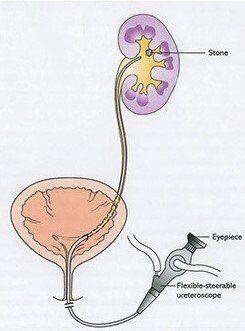Laser Stone Surgery
Holmium Laser Stone Surgery (RIRS) using Flexible Pyeloscopy
What is Laser Stone Surgery using Flexible Pyeloscopy?
Flexible pyeloscopy (or Retrograde IntraRenal Surgery- RIRS) is where a thin lighted telescope is introduced into the kidney from outside the patients without the need for any incision (see diagram).
About Laser Stone Surgery using Flexible Pyeloscopy
The diameter of the instrument is 2.5mm and allows visualisation of the entire kidney and the ureter due to the flexible nature of the scope.
It contains a small instrument port which allows the introduction of a holmium laser fibre (0.2 mm diameter) to efficiently fragment stones, and micro-baskets (less than 1mm wide) to retrieve any stone fragments.
Kidney stones up to 2cm in size can be treated using this approach.
What are the main advantages of Laser Stone Surgery using Flexible Pyeloscopy?
- Allows stone treatment without the need for any incision by using the urethra as the entry point
- Has a very high degree of success in treating stones
- Can be performed as day surgery
What are the Disadvantages of Laser Stone Surgery using Flexible Pyeloscopy?
- More invasive compared with shock wave lithotripsy
- General anaesthetic required
- Small risk of damage to the ureter (0.5%)
Before Laser Stone Surgery using Flexible Pyeloscopy
Preparation for the procedure is performed under general anaesthesia, you should have nothing to eat or drink for 6 hours prior to treatment.
Regular medications can be taken with a sip of water with the exception of blood thinning agents (eg. warfarin, aspirin, clopidogrel) or non-steroidal anti-inflammatories which may need to be stopped beforehand. Your doctor will advise you about your specific circumstances.
A midstream urine (MSU) test is required to ensure the urine is sterile before treatment is undertaken.
Day of Laser Stone Surgery using Flexible Pyeloscopy?
- All related imaging such as x-rays, CT scan or ultrasound
- Your usual medications
During Laser Stone Surgery using Flexible Pyeloscopy
What happens in the operating room? You will meet your anaesthetist prior to surgery who will take a thorough medical history. This person will be responsible for your safety whilst you are under general anaesthesia.
The procedure will usually take 60 to 90 minutes and involves putting a flexible telescope into the drainage tube of the kidney and fragmenting the stone(s) with a holmium laser. A temporary double J ureteral stent may be left in place for a short period to ensure the kidney drains without of blockage.
What are the risks with Laser Stone Surgery using Flexible Pyeloscopy?
This is generally considered a very safe operation. Specific risks to surgery include:
- infection,
- minor bleeding, and
- perforation of the ureter (1 in 200).
After Laser Stone Surgery using Flexible Pyeloscopy?
It is normal to feel the need to pass urine frequently and notice blood in the urine following surgery. This will settle over the ensuing days. An oral over the counter medication called the Ural can reduce the stinging sensation during urination.
You will sometimes have a temporary ureteric stent (see stent info sheet) following surgery which allows the stone fragments to drain unimpeded.
The stent may be attached to a string tether coming out from the urethra which allows easy removal in the doctor’s office. Care needs to be taken so as not to accidentally dislodge the stent by allowing it to get caught up on your underwear.
Laser Stone Surgery using Flexible Pyeloscopy Care Plan
You will be advised after surgery of the necessary follow-up arrangements. A script for oral antibiotics will need to be taken for 5 days to prevent infection.
You need to drink at least 8 glasses of water a day (2.5L/day). Simple analgesics such as Panadol and Nurofen are usually all that is required, occasionally stronger medication (eg. Panadeine Forte) may be necessary.
You will not be able to drive for at least 24 hours after surgery as you have had a general anaesthetic.
Extracorporeal Shock Wave Lithotripsy (ESWL)
What is Extracorporeal Shock Wave Lithotripsy?
Extracorporeal Shock Wave Lithotripsy (ESWL) involves using high-frequency sound waves from an external source outside the body to break up the kidney stone into smaller pieces and allow them to pass out through the urinary tract.
© Copyright 2020 | All Rights Reserved | Bayside Urology






